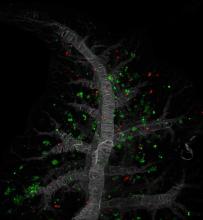News
Can What Works to Treat Cancer Work for Diabetes?
To live with type 1 diabetes is to be ruled by relentless routine. Food must be carefully monitored, and the only treatment, subcutaneous insulin, is burdensome – requiring regular injections or an insulin pump, continuous glucose monitoring and/or finger sticks to test one’s blood sugar levels. For
New Research Highlights Key Disparities in Specialized Pediatric Care
A growing body of research is uncovering the connections between health outcomes and socioeconomic factors, providing a glimpse into the hidden world of disparities that affect young patients' lives and emphasizing the need for targeted strategies to improve equity in healthcare. Lena Winestone, MD
How to BEST Manage Mental Health and Pain of a Long-term Diagnosis?
When Manvir Guleria was first diagnosed with neuroblastoma, he was a frustrated 9-year-old who didn’t know how to handle the painful treatments and long hospital stays that resulted. Manvir’s family spent more days than they could count at UCSF Benioff Children’s Hospital Oakland due to the cancer –
Eleven Cancer Research Projects Funded in Spring 2023 RAP Cycle
Eleven investigators and teams were awarded grants in support of cancer research projects in the spring 2023 cycle of the UCSF Resource Allocation Program (RAP). Funded by various agencies across UCSF, the awards span a range of topics from theranostics to molecular imaging to immunotherapy response
Which Skin Care Products Do We Really Need?
From cleansers to creams and serums to sunscreens, the skin care aisle is bursting with products that promise to make our skin look brighter, softer, younger, better. But which products are must-haves, and which are unnecessary? Should you shell out extra cash for “clean” cosmetics? And is sunscreen
UCSF Medical Center Is Among Nation’s Top Hospitals for 2023-24
UCSF Medical Center has been named to the Honor Roll of the nation’s top hospitals for adult care in U.S. News & World Report’s 2023-24 Best Hospitals rankings, representing the highest quality of care and safety standards in the country. The distinction was earned by only 22 medical centers









